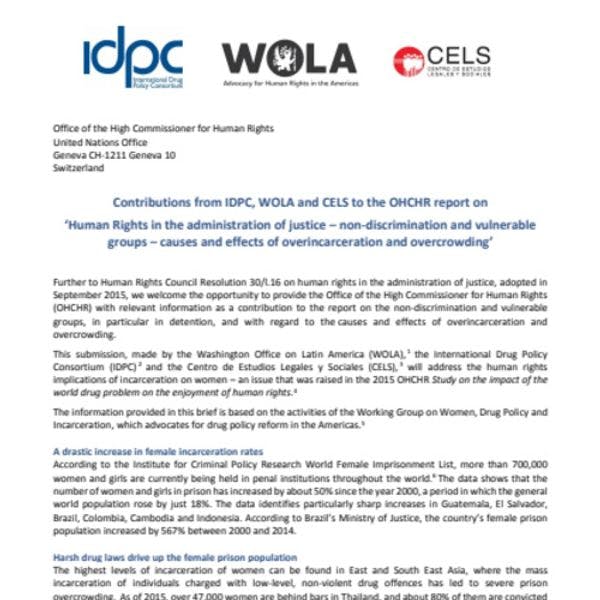Los derechos humanos en la administración de justicia: no discriminación y grupos vulnerables – Causas y efectos del recurso excesivo a la privación de libertad y el hacinamiento en las cárceles
El IDPC, WOLA y CELS abordan las repercusiones del encarcelamiento de las mujeres para los derechos humanos en su informe de contribución al próximo informe de la Oficina del Alto Comisionado de las Naciones Unidas para los Derechos Humanos sobre el recurso excesivo a la privación de libertad. Más información, en inglés, está disponible abajo.
Suscríbase a las Alertas mensuales del IDPC para recibir información sobre cuestiones relacionadas con políticas sobre drogas.
Further to Human Rights Council Resolution 30/l.16 on human rights in the administration of justice, adopted in September 2015, we welcome the opportunity to provide the Office of the High Commissioner for Human Rights (OHCHR) with relevant information as a contribution to the report on the non-discrimination and vulnerable groups, in particular in detention, and with regard to the causes and effects of overincarceration and overcrowding.
This submission, made by the Washington Office on Latin America (WOLA), the International Drug Policy Consortium (IDPC) and the Centro de Estudios Legales y Sociales (CELS), will address the human rights implications of incarceration on women – an issue that was raised in the 2015 OHCHR Study on the impact of the world drug problem on the enjoyment of human rights.
The information provided in this brief is based on the activities of the Working Group on Women, Drug Policy and Incarceration, which advocates for drug policy reform in the Americas.
Keep up-to-date with drug policy developments by subscribing to the IDPC Monthly Alert.
